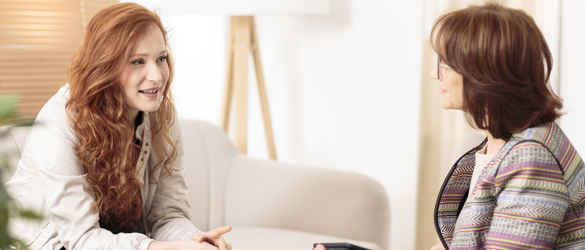"I know my eyesight will change, so I want to live in the here and now"
Posted: Monday 24 June 2024
Nancy assumed her vision changes were just part of getting older. When she noticed blank spots and disappearing words while reading, she thought she needed a new prescription.
“Like you do,” she said. “As you get older, your prescription changes.” Last April, the 49-year-old went for a routine eye test and agreed to an OCT scan at her optician’s suggestion. “I decided to have it, and I’m glad I did.”
The scan revealed dry age-related macular degeneration (AMD), a condition she had never heard of. But in her shock and confusion, Nancy didn’t ask many questions. “I didn’t really think to ask anything. It was really weird.”
She was given a leaflet and referred for further tests, but she struggled to grasp the impact of her diagnosis, until her son read the leaflet and told her, “You’re going to lose your central vision.”
Emotional hospital visit
During her hospital visit the gravity of the diagnosis started to sink in. “I had to go in on my own, because they wouldn’t let my husband in with me. I know I’m a big girl, but it would’ve been nice to have someone else there.
“She did another test, and I couldn’t really hear her properly, because she was wearing a mask, so I got slightly emotional about it, and I said, ‘Look, can you just tell me, what have I got? Is it the macular degeneration?’ She said, ‘Yes, you’ve got that. And cataracts.’ Then I just got really upset about it all.”
She added: “I had this long list of questions, and I only asked two. She just didn’t have the time for me, at all. It was a horrible experience.”
Turning to the Macular Society
Overwhelmed, she decided to turn to the Macular Society for support. “I broke down in my kitchen a bit, I was really upset, and I decided to ring the Macular Society.”
The call proved invaluable. “I rang the helpline and spoke to a wonderful lady. She answered every single question on the sheet that I’d taken in, and I had more help from her than I did from the consultant.”
Finding a local support group provided further comfort for Nancy. She said: “When I was first diagnosed, people would say to me, ‘Oh, you’re taking it really well,’ and I was like, ‘Well, I am, because so far I’ve not had a huge change in my vision.’”
Maintaining a positive outlook
Despite occasional feelings of “Why me?” Nancy maintains a positive outlook. “I have days where I get down, and just feel a bit, ‘Why me?’ But I don’t ever feel sorry for myself. I know that there are people out there who are worse off than me.
She added: “The support group helped me to realise that I’m not alone. There’s others out there.” She added: “If I’d not found the Macular Society, I’m not quite sure what I would’ve done.”
The impact of Nancy's diagnosis did not just stop with her. Her family were also affected. “When we came home after I’d received the diagnosis, we Facetimed my daughter at uni to tell her, and she broke down and was sobbing her heart out. I said, ‘What’s the matter?’ and she said, ‘You’re not going to see my babies.' She was already thinking about the future."
The here and now
She added: "I try not to think too deeply about it, because it can send you on a downward slope. I am scared, truth be told, because the prospect of what life will bring when you’re losing your sight is scary."
Since her diagnosis Nancy admitted her outlook on life has changed. “I used to think, ‘oh well, we’ll do that then’ or ‘we can put that off till later.’ But now, it’s more of, ‘let’s do it now,’ ‘let’s not put anything off till later.’
“I know that my eyesight will change I have accepted it, so that’s why I want to do everything I can whilst I have most of my sight. I also know that it’s better to take each day as it comes and to not think too much about the future, life is for living in the here and now, as they say.”
Funding research
But Nancy also remains positive about the future and has hope for a cure. She said: “We all know that research for cures are being looked into, so fingers crossed there will be something out there one day that can help me and others to keep our vision for longer.”
Donate to find a cure
We are here for Nancy. We can support her right now, but we need you to fund our support services and the research that could one day save her sight.
Let’s Beat Macular Disease together.
Donate for Nancy, and every person diagnosed
Beat Macular Disease for Nancy by funding groundbreaking research projects and vital support services. Donate today.
Support for you
We provide free information and support to those with macular disease, along with their family and friends, to help people keep their independence.




